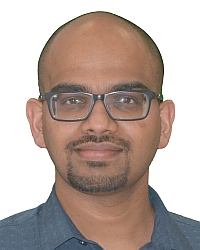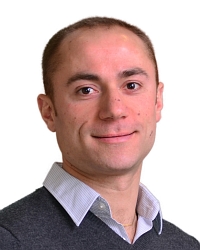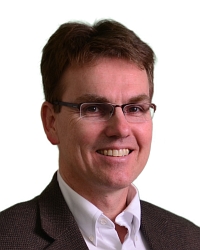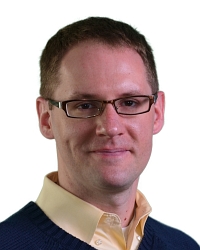TR2023-088
Moving Horizon Estimation for Digital Twins using Deep Autoencoders
-
- , "Moving Horizon Estimation for Digital Twins using Deep Autoencoders", World Congress of the International Federation of Automatic Control (IFAC), Ishii, H. and Ebihara, Y. and Imura, J. and Yamakita, M., Eds., DOI: 10.1016/j.ifacol.2023.10.207, July 2023, pp. 5500-5505.BibTeX TR2023-088 PDF
- @inproceedings{Chakrabarty2023jul2,
- author = {Chakrabarty, Ankush and Vinod, Abraham P. and Mansour, Hassan and Bortoff, Scott A. and Laughman, Christopher R.},
- title = {{Moving Horizon Estimation for Digital Twins using Deep Autoencoders}},
- booktitle = {World Congress of the International Federation of Automatic Control (IFAC)},
- year = 2023,
- editor = {Ishii, H. and Ebihara, Y. and Imura, J. and Yamakita, M.},
- pages = {5500--5505},
- month = jul,
- publisher = {Elseiver},
- doi = {10.1016/j.ifacol.2023.10.207},
- url = {https://www.merl.com/publications/TR2023-088}
- }
- , "Moving Horizon Estimation for Digital Twins using Deep Autoencoders", World Congress of the International Federation of Automatic Control (IFAC), Ishii, H. and Ebihara, Y. and Imura, J. and Yamakita, M., Eds., DOI: 10.1016/j.ifacol.2023.10.207, July 2023, pp. 5500-5505.
-
MERL Contacts:
-
Research Areas:
Abstract:
Digital twins have emerged in recent years as black-box, software-based simulation tools that can mirror the behavior of complex dynamical systems. Digital twin simulations generate the same outputs as the target system using internal states; however, these states are not readily available online from the real system. In this paper, we develop a data-driven moving horizon estimation framework capable of using online noisy measurements of the real system in order to estimate digital twin states. Our framework combines the high expressiveness of deep autoencoders with a moving horizon state estimator that accurately predicts the internal state of the black-box digital twin without access to an analytical model of the system dynamics. We demonstrate that our approach outperforms extended and Koopman Kalman filter solutions on a benchmark reverse van der Pol oscillator example.
Related News & Events
-
NEWS MERL presents 9 papers at 2023 IFAC World Congress Date: July 9, 2023 - July 14, 2023
MERL Contacts: Scott A. Bortoff; Stefano Di Cairano; Christopher R. Laughman; Diego Romeres; Abraham P. Vinod
Research Areas: Control, Dynamical Systems, Machine Learning, Multi-Physical Modeling, Optimization, RoboticsBrief- MERL researchers presented 9 papers and organized 2 invited/workshop sessions at the 2023 IFAC World Congress held in Yokohama, JP.
MERL's contributions covered topics including decision-making for autonomous vehicles, statistical and learning-based estimation for GNSS and energy systems, impedance control for delta robots, learning for system identification of rigid body dynamics and time-varying systems, and meta-learning for deep state-space modeling using data from similar systems. The invited session (MERL co-organizer: Ankush Chakrabarty) was on the topic of “Estimation and observer design: theory and applications” and the workshop (MERL co-organizer: Karl Berntorp) was on “Gaussian Process Learning for Systems and Control”.
- MERL researchers presented 9 papers and organized 2 invited/workshop sessions at the 2023 IFAC World Congress held in Yokohama, JP.
-
NEWS Keynote address given by Philip Orlik at 9th annual IEEE Smartcomp conference Date: June 26, 2023
Where: International Conference on Smart Computing (SMARTCOMP), Vanderbilt University, Nashville, Tennessee
MERL Contact: Philip V. Orlik
Research Areas: Communications, Dynamical Systems, Machine Learning, Multi-Physical Modeling, Signal ProcessingBrief- VP & Research Director, Philip Orlik, gave a keynote titled, "Smart Technologies for Smarter Buildings" at the 9th edition of the IEEE International Conference on Smart Computing (SMARTCOMP) focusing on some of the research challenges and opportunities that arise as we seek to achieve net-zero emissions in Smart building environments.
SMARTCOMP is the premier conference on smart computing. Smart computing is a multidisciplinary domain based on the synergistic influence of advances in sensor-based technologies, Internet of Things, cyber-physical systems, edge computing, big data analytics, machine learning, cognitive computing, and artificial intelligence.
- VP & Research Director, Philip Orlik, gave a keynote titled, "Smart Technologies for Smarter Buildings" at the 9th edition of the IEEE International Conference on Smart Computing (SMARTCOMP) focusing on some of the research challenges and opportunities that arise as we seek to achieve net-zero emissions in Smart building environments.



